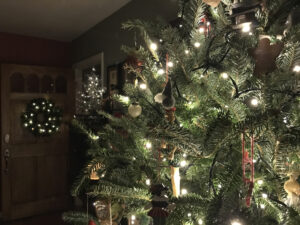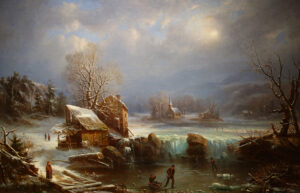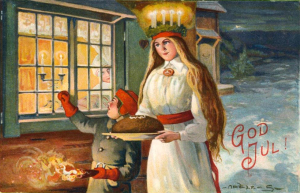It’s Christmas. All the preparations, all the frenzy, and suddenly it just appears, like the first star that glimmers after sunset on a cold night, or a just-born baby entering the world. The child and the star, part of our Christmases since the very first one, before Christmas was even called Christmas. Like the solstice story and the celestial mechanics of our universe, it is another story of which we never tire. We hear it year after year, and it means something different to us each time. And if the setting is right––a dark church, incense, a heartfelt song––the story sends us into the recesses of memory, into the arms of people long gone. The story brings us to tears, or at the very least, a moment of wistfulness. For there are the characters in the story that we hear––the Magi, the shepherds, the angels––but there are the characters we each add to the story, too, not the least of which is the child we once were. And at Christmas, we get to go back and reacquaint our old self with the more recent model. With any luck, the two recognize each other, and hopefully, even like each other.
Christmas Eve brings Christmas Day and the Twelve Days of Christmas. Depending on how you calculate such things––and there are two approaches––the Twelve Days begin on Christmas Day itself or on St. Stephen’s Day, the 26th of December. Our ancestors, who perhaps were more attuned than we to the passing of the days and to each day’s meaning, loved symmetry in numbers, and my hunch is that the system they used set the First Day of Christmas at St. Stephen’s Day. Christmas Day itself has long been seen as a day outside ordinary time. For those of us who follow the model of St. Stephen’s Day being the First Day of Christmas, Christmas Day is seen as a distinct day, followed by a beautiful symmetry that comes along with the passing of the year. In this model, we have six days of Christmas in the old year and six days in the new, creating a balanced bridge at the start and end of each year, a balance that links the other old story––that of the ever expanding round of the year as this old earth spins on its axis and rotates around the sun––to the story of the child’s birth at Bethlehem. The links connect Christmas through the years in a lovely balance. More mystery, of the universal sort, heavenly yet here on earth.
However you count your days, I am here simply to encourage you to mark them. One of the saddest sights, I think, is to see a Christmas tree tossed to the curbside for trash pick up the day or two after Christmas, and so I tend to stay in the first few days of the season. But I like it at home, anyway. It is where I feel most content. I hope you’ll join us at your home in celebrating the full season that lasts through Epiphany on the Sixth of January. And if you are a bit in love with Christmas as we are in this household, welcome. Advent has ended, Christmas has just begun. Our Christmas tree and other greenery will be illuminated tonight and every night through Epiphany, and most likely we will go even beyond, for traditionally the greenery would come down at Candlemas Eve: the First of February. Keeping it up longer would invite goblins into your home, and no one wants that. But to bring light and cheer through January is, I think, a wonderful thing.
I don’t plan on writing a Book of Days chapter for each of the Twelve Days of Christmas this year, as I’ve done other years. It’s been a very busy time, and once I make and send our Christmas cards, I am looking forward to spending some time just being still, and maybe I’ll get to read a book or two or three, and there are a bunch of Christmas movies I’d like to watch. It’s feeling like a good time to hibernate and to eat cookies for breakfast and to stay in my pajamas each day ’til 2. It’s Christmas. I think the kid I used to be would give his stamp of approval.
Merry Christmas to you all.
John
If you’d like one of those cards Seth & I will be making this coming week, just send us a holiday greeting that includes your return address, no matter where you are, and we promise one in return. You’ll find our mailing address at the Contact Us page of our website. Love and light to you all!


